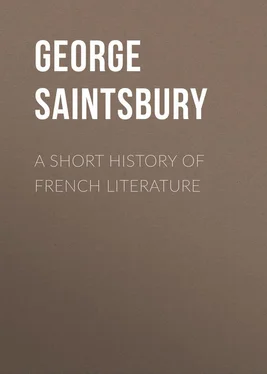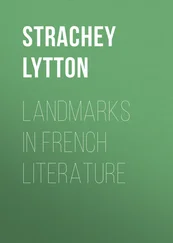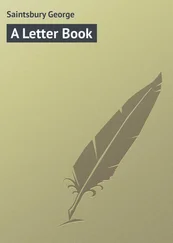George Saintsbury - A Short History of French Literature
Здесь есть возможность читать онлайн «George Saintsbury - A Short History of French Literature» — ознакомительный отрывок электронной книги совершенно бесплатно, а после прочтения отрывка купить полную версию. В некоторых случаях можно слушать аудио, скачать через торрент в формате fb2 и присутствует краткое содержание. ISBN: , Жанр: foreign_prose, на английском языке. Описание произведения, (предисловие) а так же отзывы посетителей доступны на портале библиотеки ЛибКат.
- Название:A Short History of French Literature
- Автор:
- Жанр:
- Год:неизвестен
- ISBN:http://www.gutenberg.org/ebooks/33062
- Рейтинг книги:3 / 5. Голосов: 1
-
Избранное:Добавить в избранное
- Отзывы:
-
Ваша оценка:
- 60
- 1
- 2
- 3
- 4
- 5
A Short History of French Literature: краткое содержание, описание и аннотация
Предлагаем к чтению аннотацию, описание, краткое содержание или предисловие (зависит от того, что написал сам автор книги «A Short History of French Literature»). Если вы не нашли необходимую информацию о книге — напишите в комментариях, мы постараемся отыскать её.
A Short History of French Literature — читать онлайн ознакомительный отрывок
Ниже представлен текст книги, разбитый по страницам. Система сохранения места последней прочитанной страницы, позволяет с удобством читать онлайн бесплатно книгу «A Short History of French Literature», без необходимости каждый раз заново искать на чём Вы остановились. Поставьте закладку, и сможете в любой момент перейти на страницу, на которой закончили чтение.
Интервал:
Закладка:
Froissart.
Froissart was born in 1337 and did not die till after 1409, the precise date of his death being unknown. There are few problems of literary criticism which are more difficult than that of arranging a definitive edition of his famous Chroniques 135 135 Ed. Kervyn de Lettenhove. 20 vols., Brussels. Ed. S. Luce, Paris, in course of publication. The edition of Buchon, 3 vols., Paris, 1855, is still the best for general use. Froissart's poems give many biographical details which are interesting, but unimportant. He wandered all his life from court to court, patronised and pensioned by kings, queens, and princes. He was successively curé of Lestines and canon of Chimay. In early life he was much in England, being specially patronised by Edward III. and Philippa.
. In most cases the task of the critic is to decide which of several manuscripts, all long posterior to the author's death, deserves most confidence, or how to supply and correct the faults of a single document. In Froissart's case there is, on the contrary, an embarrassing number of seemingly authentic texts. During the whole of his long life, Froissart seems to have been constantly occupied in altering, improving, and rectifying his work, and copies of it in all its states are plentiful. The early printed editions represent merely a single one of these; Buchon's is somewhat more complete. But it is only within the last few years that the labours of M. Kervyn de Lettenhove and M. Siméon Luce have made it possible (and not yet entirely possible) to see the work in all its conditions. M. Kervyn de Lettenhove's edition is complete and excellent as far as it goes. That of M. Luce is still far from finished. The editor, however, has succeeded in presenting three distinct versions of the first book. This is the most interesting in substance, the least in manner and style. It deals with a period most of which lay outside of Froissart's own knowledge, and in treating which he was at first content to paraphrase Jean Lebel, though afterwards he made this part of the book much more his own. It never, however, attained to the gossiping picturesqueness of the later books (there are four in all), in which the historian relies entirely on his own collections. Although Cressy, Poitiers, and Najara may be of more importance than the fruitless chevauchée of Buckingham through France, the gossip of the Count de Foix' court, and the kite-and-crow battles of the Duke de Berri and his officers with Aymerigot Marcel and Geoffrey Tête-Noire, they are much less characteristic of Froissart. The literary instinct of Scott enabled him (in a speech of Claverhouse 136 136 Old Mortality , chap. 35.
) exactly to appreciate our author. Some of his admirers have striven to make out that traces of political wisdom are to be found in the later books. If it be so, they are very deeply hidden. A sentence which must have been written when Froissart was more than fifty years old puts his point of view very clearly. Geoffrey Tête-Noire, the Breton brigand, 'held a knight's life, or a squire's, of no more account than a villain's,' and this is said as if it summed up the demerits of the free companion. Beyond knights and ladies, tourneys and festivals, Froissart sees nothing at all. But his admirable power of description enables him to put what he did see as well as any writer has ever put it. Vast as his work is, the narrative and picturesque charm never fails; and in a thousand different lights the same subject, the singular afterglow of chivalry, which the influence of certain English and French princes kept up in the fourteenth century, is presented with a mastery rare in any but the best literature. He is so completely indifferent to anything but this, that he does not take the slightest trouble to hide the misery and the misgovernment which the practical carrying out of his idea caused. Never, perhaps, was there a better instance of a man of one idea, and certainly there never was any man by whom his one idea was more attractively represented. To this day it is difficult even with the clearest knowledge of the facts to rise from a perusal of Froissart without an impression that the earlier period of the Hundred Years' War was a sort of golden age in which all the virtues flourished, except for occasional ugly outbreaks of the evil principle in the Jacquerie, the Wat Tyler insurrection, and so forth. As a historian Froissart is, as we should expect, not critical, and he carries the French habit of disfiguring proper names and ignoring geographical and other trifles to a most bewildering extent. But there is little doubt that he was diligent in collecting and careful in recording his facts, and his extreme minuteness often supplies gaps in less prolix chroniclers.
Fifteenth-Century Chroniclers.
The last century of the period which is included in this chapter is extremely fertile in historians. These range themselves naturally in two classes; those who undertake more or less of a general history of the country during their time, and those who devote themselves to special persons as biographers, or to the recital of the events which more particularly concern a single city or district. The first class, moreover, is more conveniently subdivided according to the side which the chroniclers took on the great political duel of their period, the struggle between Burgundy and France.
The Burgundian side was particularly rich in annalists. The study and practice of historical writing had, as a consequence of the Chronicle of Baudouin, and the success of Lebel and Froissart, taken deep root in the cities of Flanders which were subject to the Duke of Burgundy, while the magnificence and opulence of the ducal court and establishments naturally attracted men of letters. Froissart's immediate successor, Enguerrand de Monstrelet, belongs to this party. Monstrelet 137 137 Ed. Buchon. Paris, 1858.
, who wrote a chronicle covering the years 1400-1444, is not remarkable for elegance or picturesqueness of style, but takes particular pains to copy exactly official reports of speeches, treaties, letters, etc. Another important chronicle of the same side is that of George Chastellain 138 138 Chastellain has been fortunate, like most Flemish writers, in being excellently and completely edited (by M. Kervyn de Lettenhove. 8 vols., Brussels).
, a busy man of letters, who was historiographer to the Duke of Burgundy, and wrote a history of the years 1419-1470. Chastellain was a man of learning and talent, but was somewhat imbued with the heavy and pedantic style which both in poetry and prose was becoming fashionable. The memoirs of Olivier de la Marche extend from 1435 to 1489, and are also somewhat heavy, but less pedantic than those of Chastellain. Dealing with the same period, and also written in the Burgundian interest, are the memoirs of Jacques du Clerq, 1448-1467, and of Lefèvre de Saint Rémy, 1407-1436; as also the Chronicle of Jehan de Wavrin, beginning at the earliest times and coming down to 1472. Wavrin's subject is nominally England, but the later part of his work of necessity concerns France also.
The writers on the royalist side are of less importance and less numerous, though individually perhaps of equal value. The chief of them are Mathieu de Coucy, who continued the work of Monstrelet in a different political spirit from 1444 to 1461; Pierre de Fenin, who wrote a history of part of the reign of Charles VI; and Jean Juvenal des Ursins 139 139 Ed. Michaud et Poujoulat.
, a statesman and ecclesiastic, who has dealt more at length with the whole of the same reign. Of these Juvenal des Ursins takes the first rank, and is one of the best authorities for his period; but from a literary point of view he cannot be very highly spoken of, though there is a certain simplicity about his manner which is superior to the elaborate pedantry of not a few of his contemporaries and immediate successors.
Интервал:
Закладка:
Похожие книги на «A Short History of French Literature»
Представляем Вашему вниманию похожие книги на «A Short History of French Literature» списком для выбора. Мы отобрали схожую по названию и смыслу литературу в надежде предоставить читателям больше вариантов отыскать новые, интересные, ещё непрочитанные произведения.
Обсуждение, отзывы о книге «A Short History of French Literature» и просто собственные мнения читателей. Оставьте ваши комментарии, напишите, что Вы думаете о произведении, его смысле или главных героях. Укажите что конкретно понравилось, а что нет, и почему Вы так считаете.












